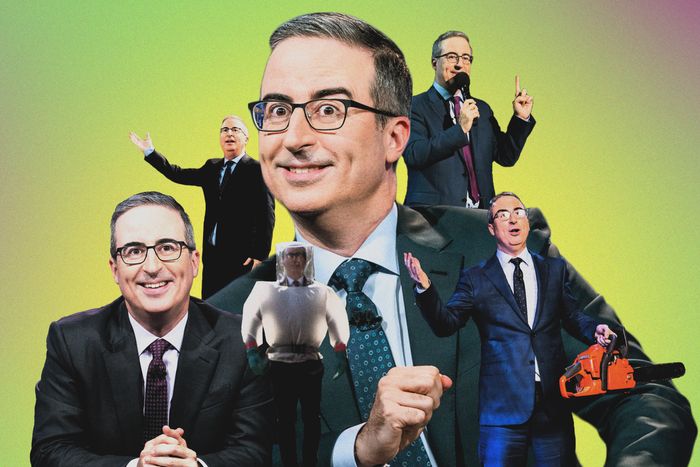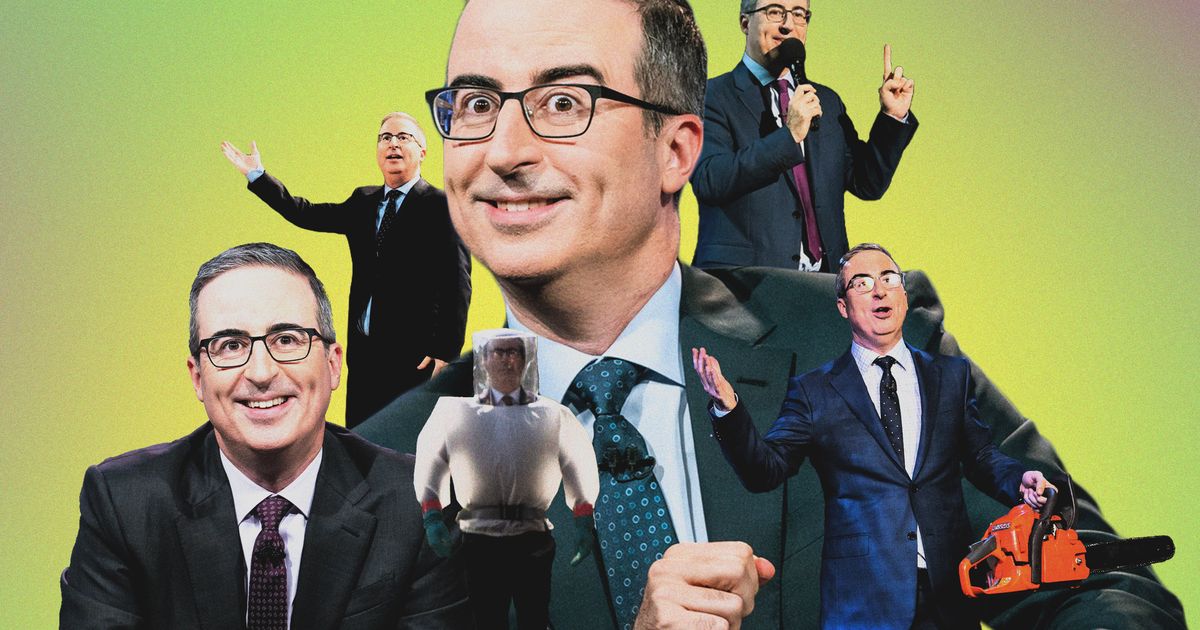
Photo-Illustration: Vulture; Photos: HBO
John Oliver’s HBO show, Last Week Tonight, doesn’t lack for acclaim. Its Emmy total stands at 30 wins and 73 nominations, including the five it’s up for this year. It has earned them all. Since debuting in 2014, Last Week Tonight has slowly refined its format so the heart of every episode is a long segment about a single topic, typically one that mainstream news outlets don’t bother covering: carbon offsets, debt-purchasing companies, jury selection, payday loans, mandatory prison sentences. These segments then have afterlives as self-contained YouTube clips and summaries by news outlets all over the world. The Guardian even has a dedicated “John Oliver Recap” column.
Oliver scrutinizes one dire situation after another, then says what the average person can do to address them. Sometimes, he concedes that the answer is “not much,” but there’s still satisfaction in having a problem laid out in terms everyone can understand. Corny? For sure. Yet Last Week Tonight has aligned itself with the pragmatic optimism of Frank Capra, whose great theme was that heroism is useless unless it moves society to collective action. Despite the constant barrage of news that makes it seem as if this country has no future, Oliver is certain it does.
Oliver’s persona on The Daily Show, the Jon Stewart news series where he got his start as a correspondent, was an Englishman bewildered by the madness of the Yanks. At first, he brought an anchorman variant of that to HBO; over time, he became less a faux newsman than that one professor whose class changes your life. Last Week Tonight has always been more thorough in its account of the week’s major issues than the nightly network shows, though at least Seth Meyers, Stephen Colbert, and Jimmy Kimmel all sounded the Klaxon about Donald Trump while their colleague Jimmy Fallon mussed his hair. But since Trump’s reelection, the only pro in the game who matches Oliver in intellect and eloquence is Colbert, who has turned into a cross between Johnny Carson and bygone TV preacher Archbishop Fulton J. Sheen. But Colbert’s platform, The Late Show, was canceled as a sacrifice to Trump, whose administration had the power to block the sale of CBS’ parent company, Paramount Global, to Skydance Media, so even his funniest bits now feel like last words. And there seems to be a generalized awareness among his colleagues (including Stewart, whose show is also Paramount property) that they could be targeted next. Oliver’s seems to be the last late-night show operating from a place of hope.
That does not mean his pugnacity has dimmed. He carries on like the Fool in King Lear, the only character allowed to razz a sundowning tyrant and keep his head. Part of Oliver’s confidence surely derives from knowing HBO’s track record: The network has a long history of endlessly renewing unglamorous, un-buzzy programs — everything from Real Sex and Taxicab Confessions to Arli$$ and Real Time With Bill Maher — because they have rock-solid cores of die-hard fans who will renew their subscription as long as new episodes are being made. That plus all the Emmys may be what emboldens Last Week Tonight to strut where others may watch their step.
In his April 27 episode this year, for example, Oliver hit back at Health and Human Services secretary RFK Jr. for saying children who have “regressed into autism” by age 2 are “kids who will never pay taxes, they’ll never hold a job, they’ll never play baseball, they’ll never write a poem, they’ll never go out on a date. Many of them will never use a toilet unassisted.” Oliver replied, “To be clear, lots of people with autism can do the things that RFK listed there,” but, he added, “even if someone can’t play baseball or write a poem or needs assistance using the toilet, their life still has dignity and meaning.” And in a scorching June 22 piece on generative AI, Oliver continually brought the argument back to a fundamental but often overlooked human issue with the industry. “The technology that makes it possible only works because it trains on the work of actual artists,” he said. As AI usage becomes ubiquitous, he’s speaking to an audience full of people who may actually be swayed simply because he makes a good point. “Any enjoyment you might get from weird, funny AI slop tends to be undercut when you know that someone’s work was stolen in order to create it.”
Even more striking, given our toxically reactionary climate, Oliver has spent a decade advocating for the rights of trans people. “It’s no more okay to ask transgender people about their sex organs than to ask Jimmy Carter whether he’s circumcised,” he said. This year, in a much-quoted March 9 segment on trans athletes competing in sporting events, Oliver cut the jokes and asked viewers to “recognize the ugliness of how this issue gets discussed and how it’s been cynically used to advance the eradication of trans people generally.”
As principled as he may be, he’s not above pettiness, as evidenced by the result of this 2017 segment focusing on the aggressively litigious American coal-mining executive Bob Murray, who sued Last Week Tonight for “character assassination.” After the suit was dismissed and Murray’s appeal rejected, Oliver celebrated by performing a jaunty tune from the so-called Eat Shit, Bob: The Musical. This is a recurring tactic in every segment of every episode: load up the viewers with facts and argumentation, then reward their diligence with silliness. These things tend to take on a life of their own. As he told Colbert, sometimes “a joke leaves the building and comes back better than we sent it out there” — even when the reply comes from one of his targets. Once, Oliver briefly goofed on Danbury, Connecticut, in a piece about lethal injection, and the mayor of Danbury responded by opening the John Oliver Memorial Sewer Plant.
As Colbert leaves the building and we take stock of late-night, you look back over Last Week Tonight’s 11-year run and you’ll see Oliver and his writers building a worldview around the core belief that our government should make sure peoples’ basic needs are met, their rights protected, and their innate value as human beings reaffirmed, and that the primary role of democratically elected government, as he says over and over, should be to protect the powerless from the powerful. We need to see this belief articulated in all mass media, not just on comedy news programs. Oliver feels like a last man standing saying something that was once commonplace. It’s always tricky to treat any celebrity as a role model, Oliver himself has cautioned against it, but I will say I’m grateful not just for his presence and consistency but the emboldening effect of hearing a funny Englishman go on TV every Sunday night and remind us of the things we are supposed to stand for.
Related

